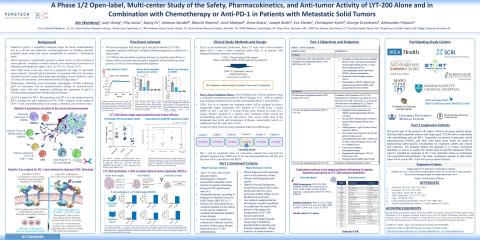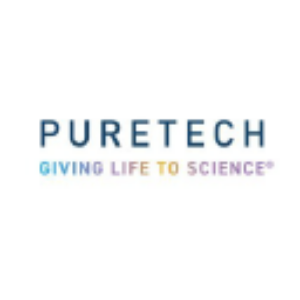PureTech Presents Clinical Trial Design Supporting Wholly Owned Immuno-Oncology Candidate LYT-200 at the Society for Immunotherapy of Cancer (SITC) 36th Annual Meeting
LYT-200 is being advanced in a range of difficult-to-treat solid tumors including pancreatic cancer, colorectal cancer and cholangiocarcinoma
Phase 1 portion of its adaptive Phase 1/2 trial with LYT-200 in solid tumors continues to progress, with a maximum tolerated dose not yet reached

The scientific poster to be presented at SITC details the Company’s adaptive Phase 1/2 clinical trial of LYT-200, an investigational monoclonal antibody targeting galectin-9, which is an immunosuppressive protein prominently expressed in multiple difficult-to-treat cancers, including, but not limited to, pancreatic cancer, cholangiocarcinoma, and breast cancer. The clinical study includes a dose finding/dose escalation phase (part 1) and an expansion cohort phase (part 2) in patients with relapsed and refractory metastatic solid tumors. The trial will assess the safety, tolerability, pharmacokinetics, pharmacodynamics, immunogenicity and preliminary anti-tumor activity of LYT-200 both as a single agent and in combination with either BeiGene’s tislelizumab or chemotherapy. Topline results from the Phase 1 portion of the study are now expected in the first half of 2022 to allow for continued dose escalation as a maximum tolerated dose has not yet been reached.
“PureTech’s preclinical data package elegantly supports the significance of galectin-9 as a therapeutic target, showing it is a multifaceted immunosuppressor in cancer biology and potential biomarker of prognosis,” said
“High galectin-9 levels in patients have been associated with a worse prognosis, and our anti-galectin-9 research candidates outperformed approved immunotherapies in multiple preclinical models of difficult-to-treat cancers, giving us confidence as we moved into the clinical phase to establish key safety and therapeutic parameters and initial insights into efficacy,” said
Part 1 is a dose-finding study being conducted using a reassessment method to evaluate safety and establish the recommended Phase 2 dose. Two to six patients per treatment cohort are assigned to receive sequentially higher intravenous infusions of LYT-200 every two weeks on day one and day 15 of each 28-day cycle, starting at a dose of 0.2 mg/kg, with escalating dose cohorts up to 16 mg/kg. Part 1 will be completed when six consecutive patients have received the optimal biologic dose and/or the maximal tolerated dose. The study is currently evaluating patients enrolled in the fourth cohort of part 1 at an active dose measuring 6.3 mg/kg. The Phase 2 portion of the study is currently planned to enroll patients with a range of solid tumor types, including pancreatic cancer and other GI solid tumor types.
The
About LYT-200
LYT-200 is a fully human IgG4 monoclonal antibody targeting a foundational immunosuppressive protein, galectin-9, for the potential treatment of solid tumors, including pancreatic ductal adenocarcinoma, colorectal cancer and cholangiocarcinoma, that are difficult to treat and have poor survival rates.
About
For more information, visit www.puretechhealth.com or connect with us on Twitter @puretechh
Cautionary Note Regarding Forward-Looking Statements
This press release contains forward-looking statements within the meaning of the Private Securities Litigation Reform Act of 1995. All statements contained in this press release that do not relate to matters of historical fact should be considered forward-looking statements, including without limitation statements that relate to our expectations regarding the potential therapeutic benefits of LYT-200 in patients with solid tumors, the design of the Company’s adaptive design Phase 1/2 trial for LYT-200, the progression and expected timing of results from our Phase 1/2 trial of LYT-200, and any incentives that the Company may receive as a result of LYT-200 receiving orphan drug designation. The forward-looking statements are based on current expectations and are subject to known and unknown risks, uncertainties and other important factors that could cause actual results, performance and achievements to differ materially from current expectations, including, but not limited to, those risks, uncertainties and other important factors described under the caption "Risk Factors" in our Annual Report on Form 20-F for the year ended
View source version on businesswire.com: https://www.businesswire.com/news/home/20211112005383/en/
Investors
+1 617 651 3156
amt@puretechhealth.com
+1 774 278 8273
nichole@tenbridgecommunications.com
Source:







